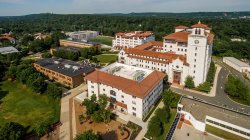Teacher Education Program Featured as Providing Strong Research-Based Teacher Preparation
Teacher Education and Deeper Learning: These 7 Schools are Doing it Right
Posted in: College News and Events

Teacher education programs catch a lot of flak. In The New York Times alone, they have been called, among other things, “barren in the area of standards” and “mediocre.” Well-funded think tanks, meanwhile, combine these criticisms with rankings and recommendations based on partisan beliefs, rather than research.
The question then arises: What does strong, research-based teacher preparation look like? And who’s doing it?
National Education Policy Center Fellow Jeannie Oakes and her co-author, Linda Darling-Hammond, explore these questions in a new book entitled Preparing Teachers for Deeper Learning.
The book describes the approaches employed by seven teacher preparation programs that embrace “deeper learning,” a research-based approach that emphasizes five essential elements for teacher education:
- Developmentally grounded and personalized
- Contextualized
- Applied and transferred
- Accessed in productive communities of practice
- Equitable and oriented to social justice
Oakes and Darling-Hammond selected the seven programs based on references from experts in the field, document reviews, prior studies, evaluations, and evidence about practices and outcomes, including extensive surveys of graduates and local hiring managers such as principals. Geographic diversity was also taken into account, as was the desire to highlight programs with different structures ranging from traditional, undergraduate teacher education to a residency program based at a charter school. Common characteristics of the program include extensive amounts of time spent in schools, diverse student bodies, a focus on project-based learning, and the use of cohort models.
The programs are:
- Alverno College, a private, women’s Catholic college, located in Milwaukee, Wisconsin, offering graduate (co-ed) and undergraduate (single-sex) teacher education;
- Bank Street College of Education, a private, graduate-level college in New York City;
- High Tech High, a San Diego, California residency in which students teach in the High Tech High charter network throughout their program;
- Montclair State University, a public university in New Jersey that offers multiple pathways into the profession, including traditional undergraduate, graduate, and a teacher residency;
- San Francisco Teacher Residency, a teacher preparation program created through a partnership between the San Francisco Unified School District, the University of San Francisco, the Stanford Teacher Education Program, and the United Educators of San Francisco (the union for SFUSD teachers and paraprofessionals);
- Trinity University, a small, private university in San Antonio, Texas, that focuses on graduate teacher education; and
- The University of Colorado at Denver, a public university that has a large teacher education program offering multiple pathways, including traditional undergraduate, a route for first-generation undergrads who work as paraprofessionals in schools while in college, a teacher residency with Denver Public Schools, and several additional graduate programs.
Vignettes, based on extensive observations, illustrate the programs’ approaches. For example, one vignette focuses on a Montclair State program called Art Backpacks, a clinical experience opportunity for prospective teachers that connects local artists to students and families at a dual-language elementary school in Newark, NJ. Another portrays an intern teacher at High Tech High, a former ecologist teaching a 12th-grade environmental science class, who worked with his students to re-till the school garden after someone unintentionally killed all the fruits and vegetables with a chemical spray: The teaching moment highlighted the effects of chemicals on food sources. yet another follows a Trinity College teacher candidate as she uses as Socratic Seminar approach to help an AP World History class to better understand the concept of apartheid, connecting it to conditions in the United States and abroad.
The book concludes with multiples recommendations for scaling high-quality, deeper-learning-infused teacher education:
- Incorporate deeper learning into licensing and accreditation standards;
- Incorporate deeper learning approaches into performance-based teacher education program accreditation;
- Fund teacher education at the level of other clinical professions such as nursing; and
- Use federal funds to incentivize program improvement and partnerships with school districts and schools, and to offer scholarships and loan forgiveness to candidates who commit to serving long-term shortage areas and locations.
Article originally appeared in The National Education Policy Center
